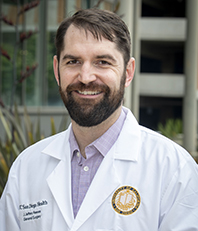Q & A with Jeff Reeves

Jeff Reeves, M.D., is a fellow in the Division of Minimally Invasive Surgery in the Department of Surgery. His research interests include making healthcare systems more efficient to lower patient costs, increasing healthcare access and improving provider well-being. Reeves, along with Bryan Clary, M.D., M.B.A., and Garth Jacobsen, M.D., recently released a study on how reducing inefficiencies can positively impact residents and hospitals.
January 27, 2025 | Interview by Samantha Phan
Why were you drawn to UC San Diego? Why stay here?
I did my residency at UC San Diego. Seeing things like the Center for the Future of Surgery, Joan & Irwin Jacobs Center for Health Innovation, and the different hospitals and rotations here really impressed me. I decided to stay because of the people I work with. Bryan Clary, M.D., M.B.A., Chris Longhurst, M.D., M.S., Garth Jacobsen, M.D., Kristin Mekeel, M.D., and Santiago Horgan, M.D., have all been great mentors to me. I did a research fellowship here with all of them and that experience was really transformative. UC San Diego has everything you could want in a training program, from access to the best simulation training centers to a wide breadth of patients. It’s hard to pass up.
You, along with Bryan Clary, M.D., M.B.A., and Garth Jacobsen, M.D., recently released a paper on reducing hospital inefficiencies and resident well-being. Tell us about the inspiration for this project.
It came from the top. Clary and Jacobsen knew we struggled with work hours. They approached us with the idea of leveraging the Lean methodology, which eliminates inefficiencies, to tackle the issue. We brought the idea to the residency council, where resident representatives meet on a monthly basis to talk about issues within our residency program. Many residents were struggling to stay within their 80-hour work week limit. We needed to figure out a way to reliably and sustainably create a healthy working environment.
Why do you think it was so challenging for residents to stay under the 80-hour limit?
Two things stand out. Volume and culture. In my biased experience, general surgery residents are some of the most hardworking physicians there are. Our department has grown substantially over the past decade in terms of the number of patients we take care of, yet the number of residents remain constant. When you put our residents in a place like UC San Diego, which strives for excellence, they have a drive to constantly do more and more for their patients, wanting to always be available and helpful. The high patient volume across five different hospitals and our culture of hard work and dedication can make it hard for providers to focus on their well-being.
What were the key takeaways from this project?
First, meaningful change requires a holistic and system-based approach, cultural support from leadership and engagement of front-line providers. Second, what we are starting to see more broadly is a recognition that healthcare workers do better when they are taking care of themselves. It is really easy to get burnt out, which can lead to suboptimal outcomes. This project found that by eliminating inefficiencies from our practices and changing culture, we can improve working conditions for residents, allowing them to have more time for themselves and for their patients. To me, a thriving institution is one that is filled with individuals who are also thriving.
Do you think the residency program has changed since you were a resident?
I think our program has evolved every single year in the eight years I’ve been here. When I reflect back on it, I have found that every year we do something a little bit better. That is one of the things I love about our residency program — we don’t try to settle. Every class of residents always strives to make things better for the next group.
Is there anything else you would like to say before we finish?
Efforts to improve our program cannot be done by one or two individuals. It is not only the system but the people who support that system. This includes our program coordinators Lupita Nuño and Ryan Cook, our administrative assistants, all of the residents and faculty, and everyone else it takes to efficiently run a program. It’s nice to be part of such a big family in the Department of Surgery. Finally, the job is not done. There are many, many things we can do better and continued efforts to improve lie ahead. This is the exciting part.
